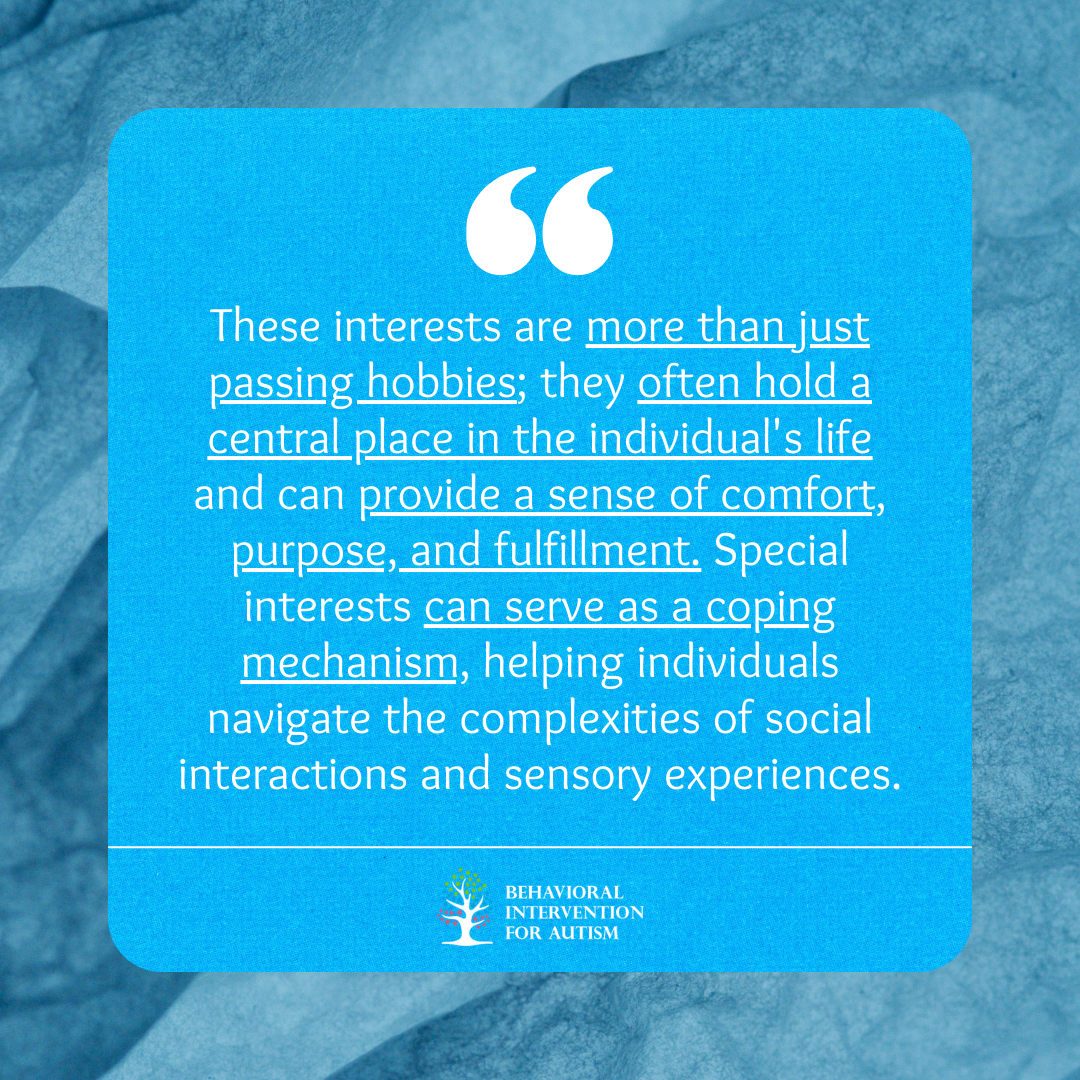
Table of Contents
For individuals with autism, special interests, or intense hobbies, are characterized by a profound enthusiasm for certain topics or activities. Special interests can vary widely, encompassing a range of subjects from trains and animals to mathematics and music.
Can You Have a Special Interest Without Autism?
Yes, it is possible to have a special interest without being on the autism spectrum. Special interests are often defined as intense, focused passions or hobbies that individuals engage in deeply. While they are commonly associated with autism, where they can be a significant aspect of an individual’s identity and daily life, they are not exclusive to autistic individuals. People across various neurotypical and neurodivergent backgrounds can develop deep interests in subjects such as art, science, music, or sports, often spending considerable time exploring and learning about them.
However, it’s important to note that the nature and intensity of special interests can differ between autistic and non-autistic individuals. For many autistic people, these interests might be more intense and pervasive, sometimes serving as coping mechanisms or a means of self-expression. Conversely, while neurotypical individuals can certainly have strong interests, these may not always reach the same level of focus or impact on their lives. Ultimately, special interests can be a rich and meaningful part of anyone’s experience, regardless of their neurological makeup.
The Relationship Between Special Interests and Autism
In the context of autism, special interests are considered to be a common trait among individuals on the autism spectrum.

Moreover, special interests in autism can be a valuable tool for self-expression and communication. They enable individuals to highlight their abilities, expertise, and skills in ways that may be harder to accomplish through conventional forms of expression. Special interests can also serve as a gateway to learning and skill development, fostering creativity and innovation.
While special interests are closely associated with autism, it is important to recognize that having a special interest does not necessarily indicate the presence of autism. Many individuals without autism also exhibit intense interests and passions in specific areas. Understanding the nuances of special interests and their role in the lives of individuals with autism is essential for providing appropriate support and encouragement to help individuals thrive.
Common Misconceptions
Common misconceptions about special interests and autism often hinder understanding. Let’s explore one prevalent myth and the corresponding fact.
Myth: All Individuals with Special Interests Have Autism
There exists a widespread belief that special interests are exclusive to individuals on the autism spectrum. This misconception often leads to a generalization that anyone displaying a strong interest in a particular topic must have autism. However, it is essential to recognize that special interests are not solely indicative of autism and can manifest in individuals without an autism diagnosis.
Fact: Special Interests Can Occur in Individuals Without Autism
Special interests, characterized by intense focus and deep knowledge in a specific subject or activity, are not unique to individuals with autism. People without autism can also exhibit strong interests and passions that captivate their attention and drive their enthusiasm. These interests may vary widely, from art and music to sports and technology, showcasing the diverse nature of human passions.
Dispelling the myth that special interests are synonymous with autism promotes a more inclusive view of how individuals express their passions and engage with the world. Recognizing that special interests can exist in both autistic and non-autistic individuals fosters a nuanced understanding of human behavior and individuality.

Impact of Special Interests
Special interests can have both positive aspects and challenges, affecting individuals in various ways. Understanding these impacts is essential for caregivers and individuals themselves to navigate through daily life.
Positive Aspects of Special Interests
Special interests can bring a sense of joy, fulfillment, and purpose to individuals, including those with autism. They can serve as a source of motivation and enthusiasm, driving individuals to explore, learn, and excel in their areas of interest. Here are some positive aspects associated with special interests:
- Increased motivation and engagement
- Opportunities for skill development
- Enhanced focus and attention
- Emotional regulation and stress relief
- Sense of identity and belonging
Embracing these positive aspects can empower individuals with autism to harness their special interests as tools for personal growth and self-expression.
Challenges Associated with Special Interests
Despite the many benefits, special interests can also present challenges that individuals may face. It’s important for caregivers and individuals to recognize and address these challenges to ensure a well-rounded approach to managing special interests. Some challenges associated with special interests include:
- Difficulty transitioning away from the special interest
- Social challenges related to sharing or discussing the interest
- Impact on daily routines and responsibilities
- Potential for obsessive behaviors or rigidity
- Limited focus on other activities or interests
Acknowledging these challenges enables caregivers and individuals to collaborate in finding a balance that fosters special interests while addressing potential obstacles. This holistic approach supports individuals with autism in fully embracing their passions while navigating daily complexities.
Nurturing Special Interests
Nurturing special interests in individuals with autism requires a supportive environment that encourages exploration and growth. Fostering a positive approach helps caregivers and individuals effectively navigate the unique challenges that may arise.
Encouraging Exploration and Development
Encouraging individuals to explore and develop their special interests can have a profound impact on their overall well-being and sense of self. Providing opportunities for hands-on exploration, access to relevant resources, and engaging in open discussions can help individuals with autism immerse themselves in their interests.
- Allow ample time for the individual to engage with their special interest
- Provide access to materials and tools related to the interest
- Encourage participation in activities or groups that align with the interest
- Support the individual in setting goals and milestones related to their interest
Creating a supportive environment that values and respects an individual’s special interests empowers those with autism to enhance their skills, knowledge, and passion in meaningful ways.

Balancing Special Interests with Daily Life Challenges
While special interests play a significant role in the lives of individuals with autism, it’s important to strike a balance between nurturing these interests and addressing the daily life challenges that may arise. Finding a middle ground that allows individuals to pursue their interests while also tending to responsibilities can promote a sense of fulfillment and well-rounded development.
- Establish a daily routine that accommodates time for engaging with the special interest
- Help the individual prioritize tasks and responsibilities alongside their interest
- Support the development of social skills and interactions related to the special interest
- Seek professional guidance and resources to address any challenges that may arise
Proactively addressing daily living challenges and integrating special interests into a balanced lifestyle allows caregivers to help individuals with autism navigate their passions while fulfilling everyday obligations. This holistic approach fosters overall well-being and enhances success in personal and social environments.
Discovering Your Unique Interests
Having a special interest is not exclusive to autism; many individuals, regardless of their neurodiversity, can develop intense passions for specific topics or activities. These interests often serve as a source of joy, motivation, and even comfort, enriching personal experiences and social interactions. While not everyone experiences special interests in the same way, we believe that exploring and nurturing these passions can be beneficial for all.
Behavioral Intervention For Autism provides exceptional ABA therapy in Florida, focusing on individualized approaches that help individuals thrive. Our dedicated team is committed to fostering growth and promoting well-being through personalized strategies. If you’re curious about how we can support you or your loved ones in discovering and nurturing their interests, don’t hesitate to connect with us today!
- 9 Common Obsessions of Children With Autism You Should Know - February 25, 2025
- What is Neurodiversity? A Guide to Embracing Differences - February 25, 2025
- Understanding Hyperfocus in Autism: What It Means and Why It Happens - February 25, 2025
